May 16
Up at 5:15, mini-breakfast, out for game drive and back for maxi-breakfast at 9:30. Best way to explain the outing is with photos, below. The first is an excellent example of an uncommon specie, the bright-shoed, rolling-eyed teenager (female) 😄.Long break to relax, blog, begin to pack, etc (interrupted, of course, by another meal) before our river boating safari, starting at 3PM.
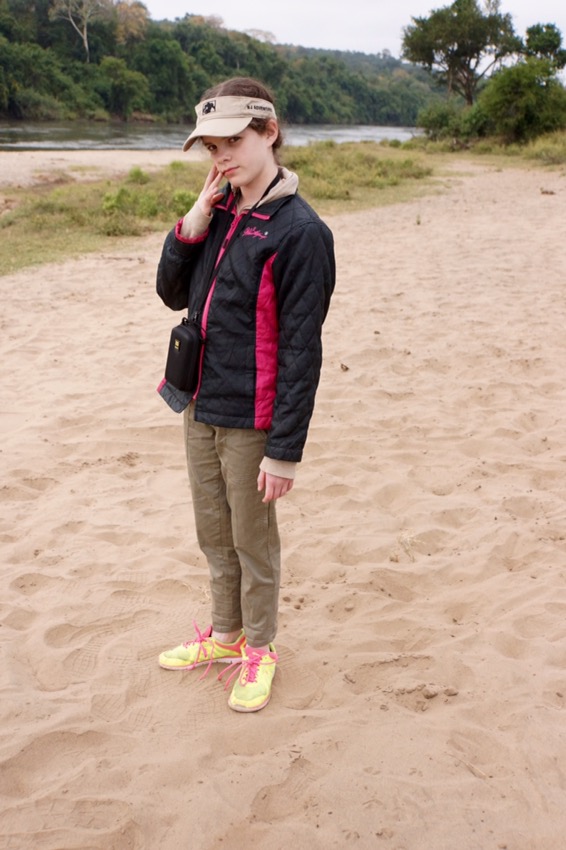
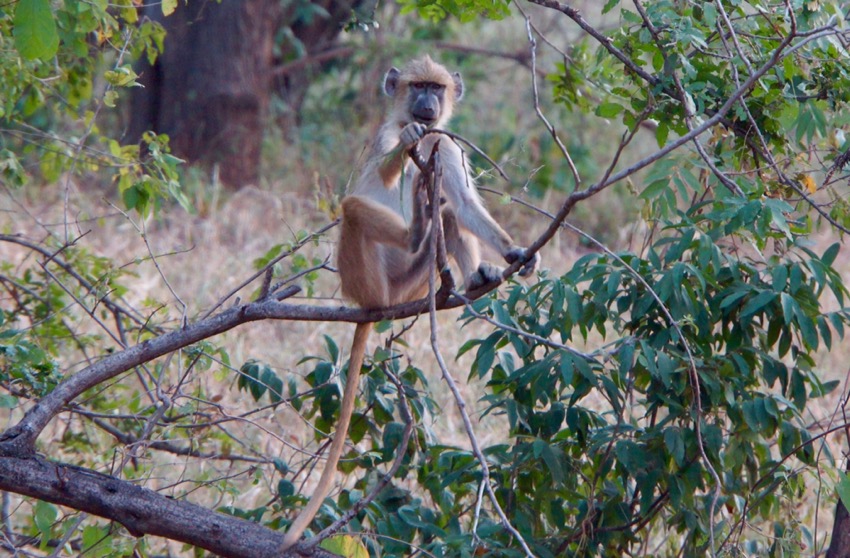 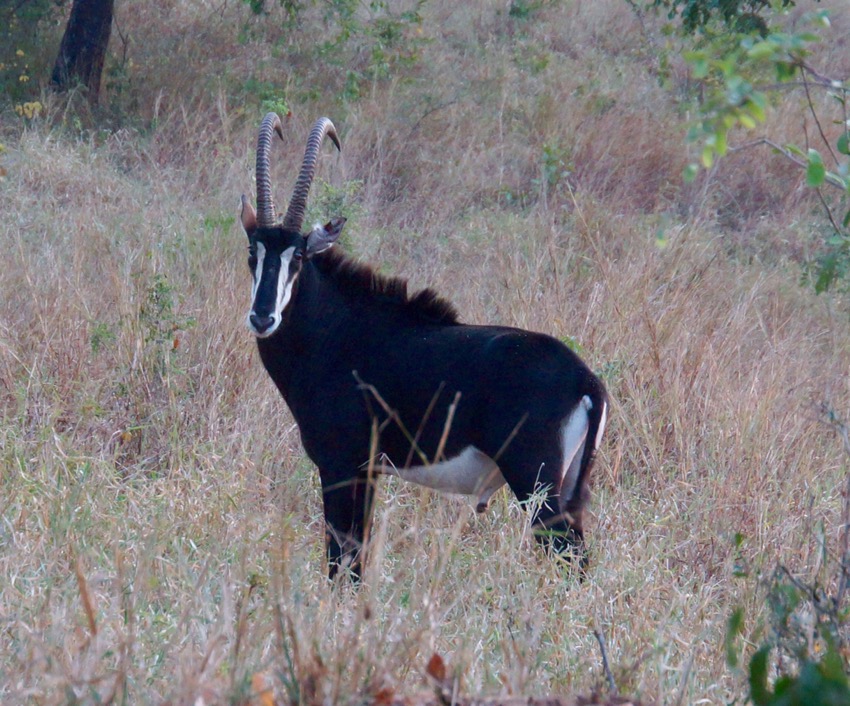 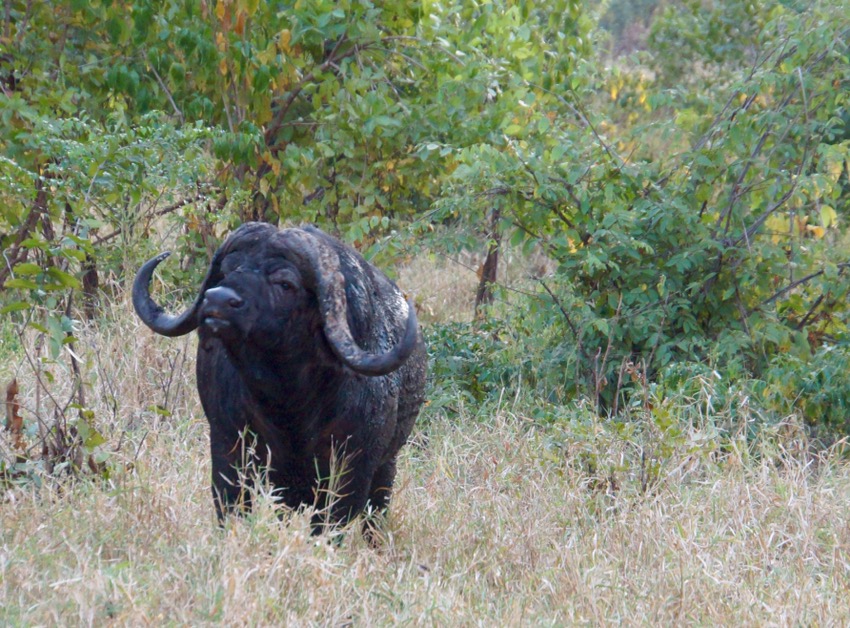
During the break, Carol and Jodi play the traditional African Safari game of spit.
 River safari doesn’t happen because of boat problem.So, instead we do another land safari, ending in a great sundowner sunset. River safari doesn’t happen because of boat problem.So, instead we do another land safari, ending in a great sundowner sunset.
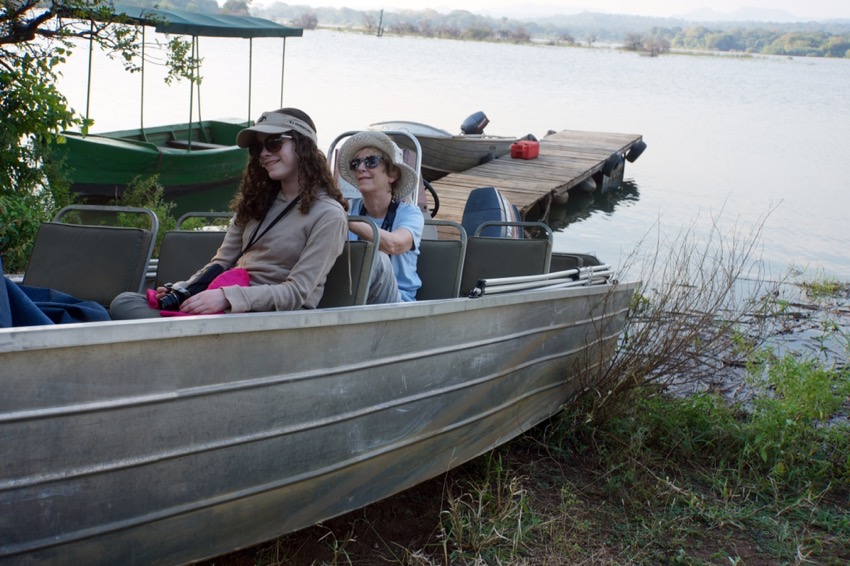 
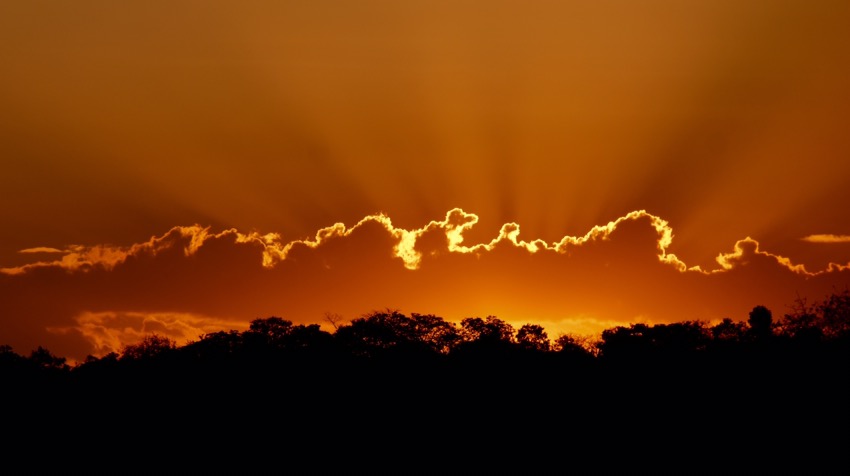
Black rhinos that supposedly inhabit the park remain clandestine.
As it turns dark, I get the idea of shooting the back of our spotter at slow speeds, as he swings the spot light back and forth across the road. You may hate these (or at least not like so many of them), but I love them, and it’s my damn blog, so I’m puttin’ them in. (I’d be interested in reactions–love ’em, hate ’em, don’t see what the big deal is.)
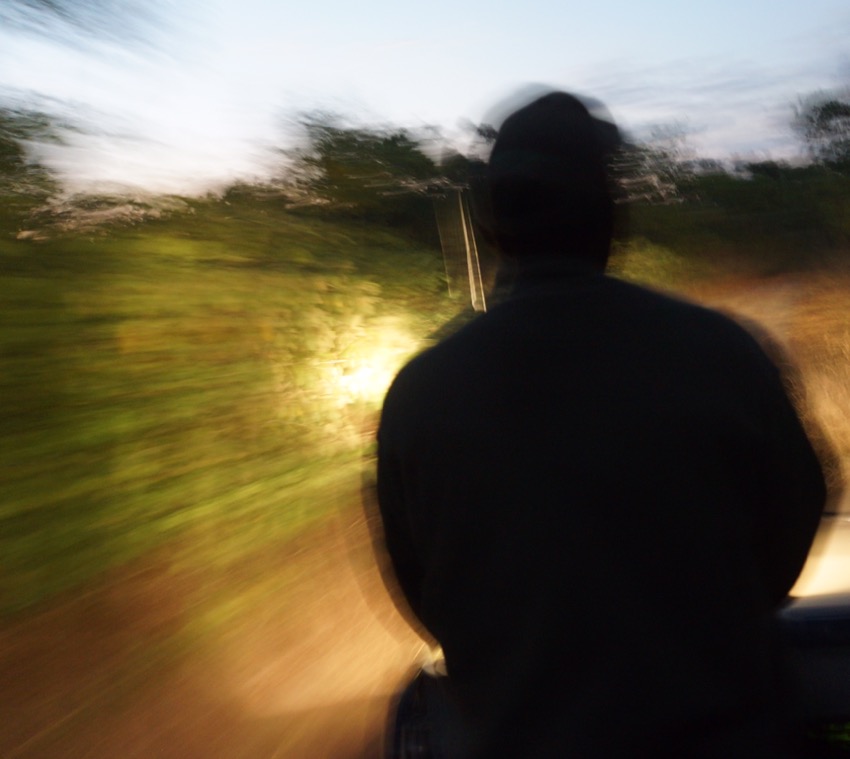 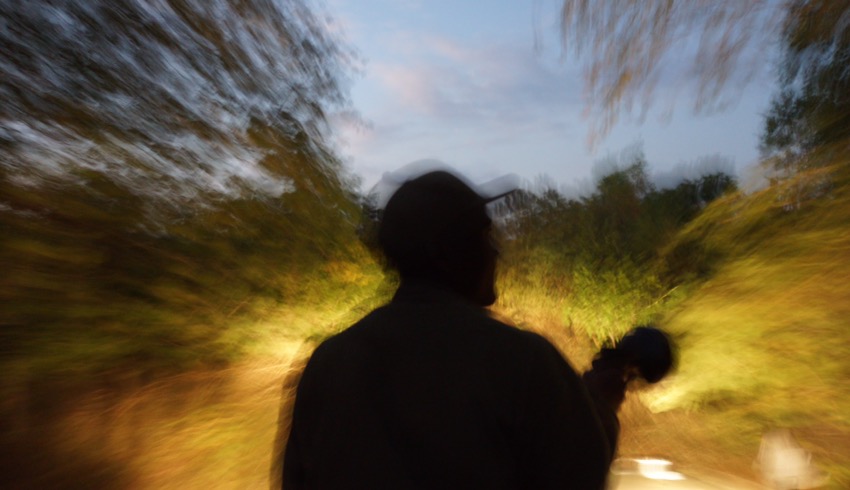 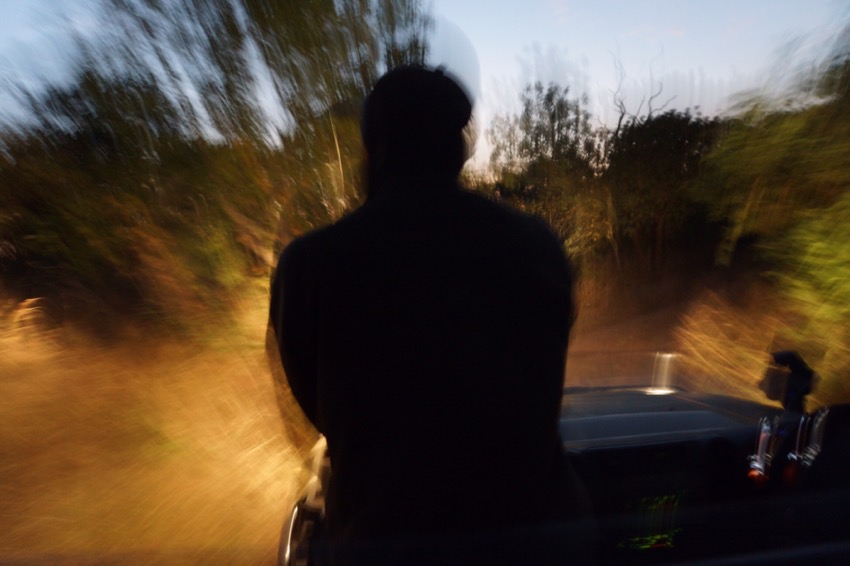
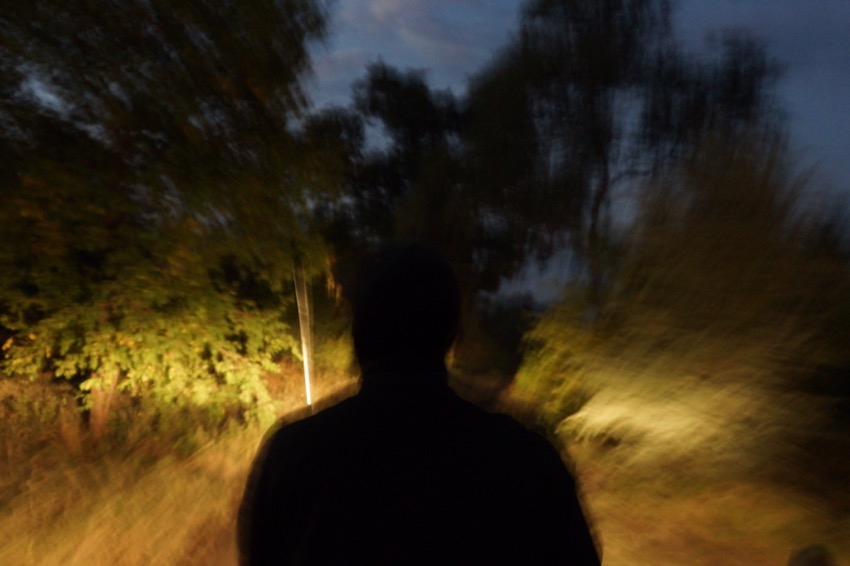 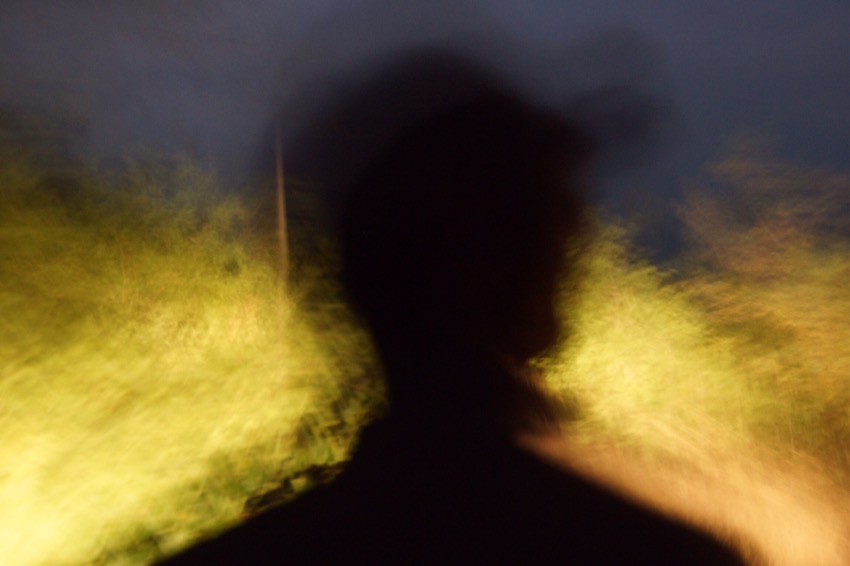 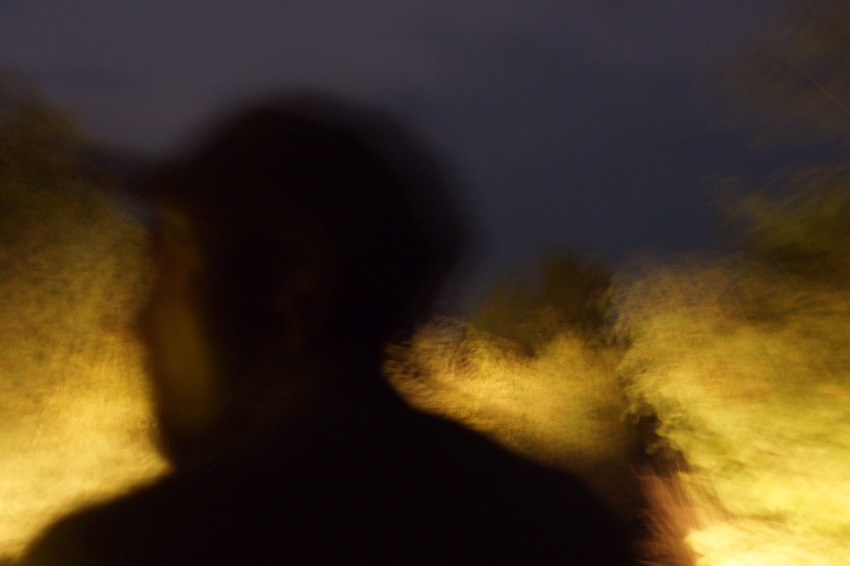
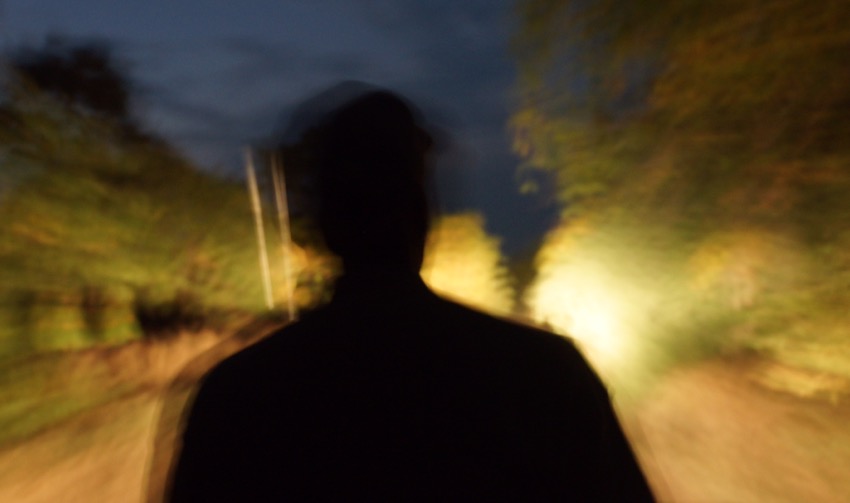 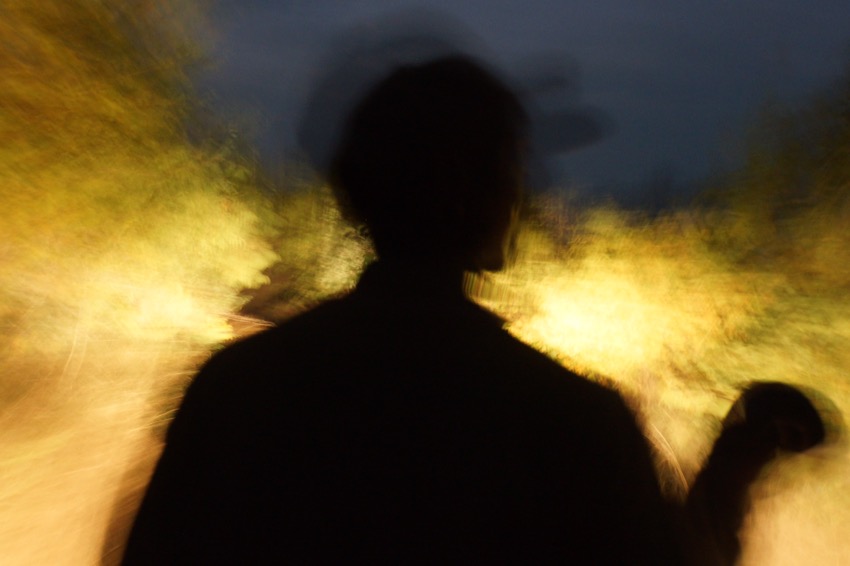 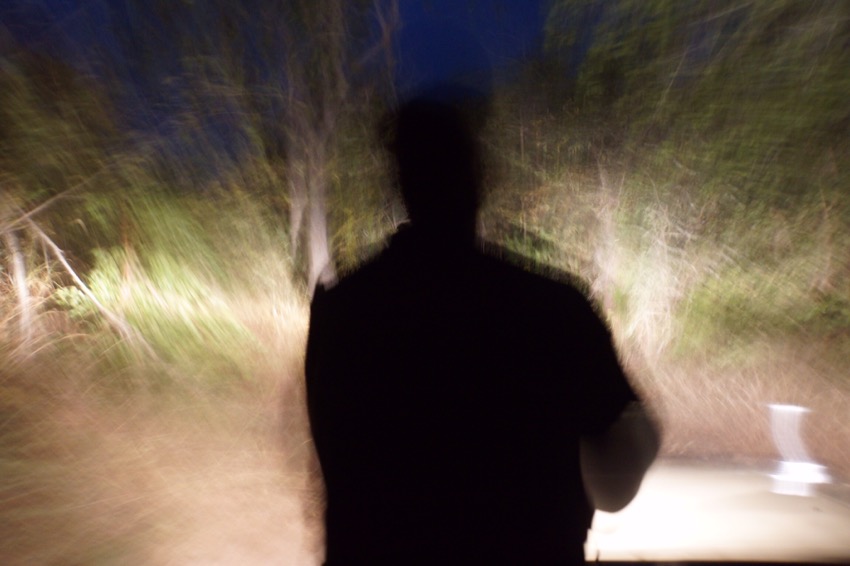
 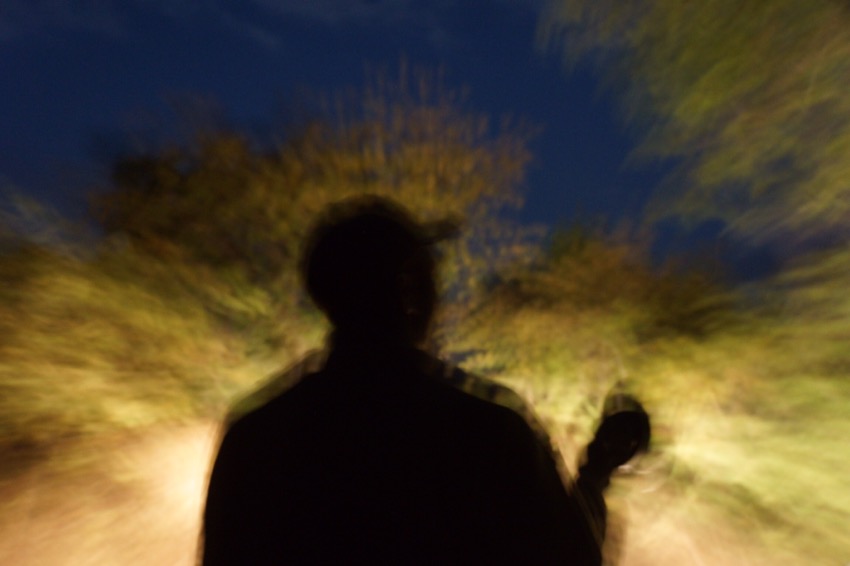 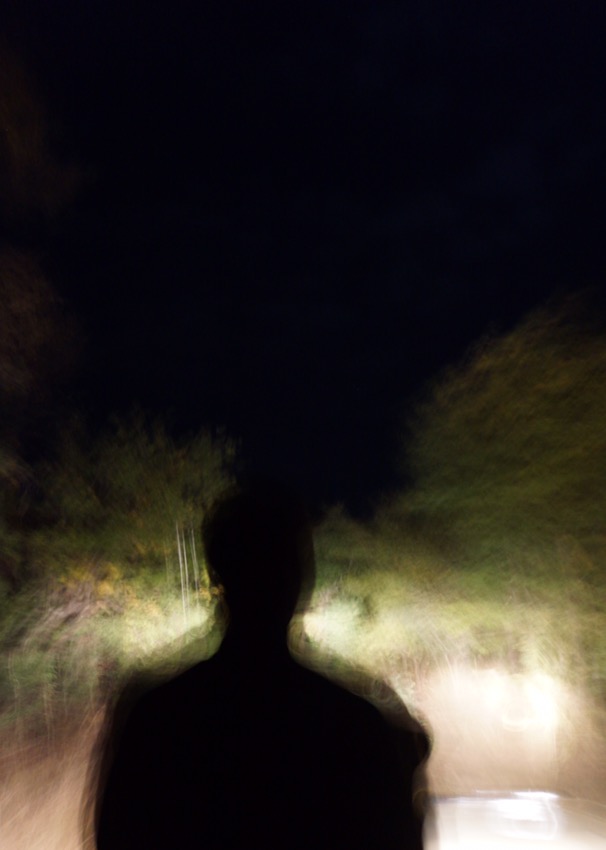
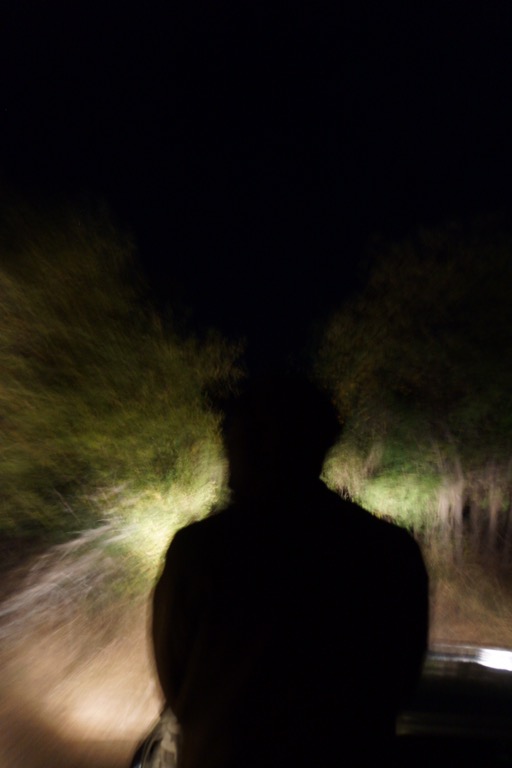 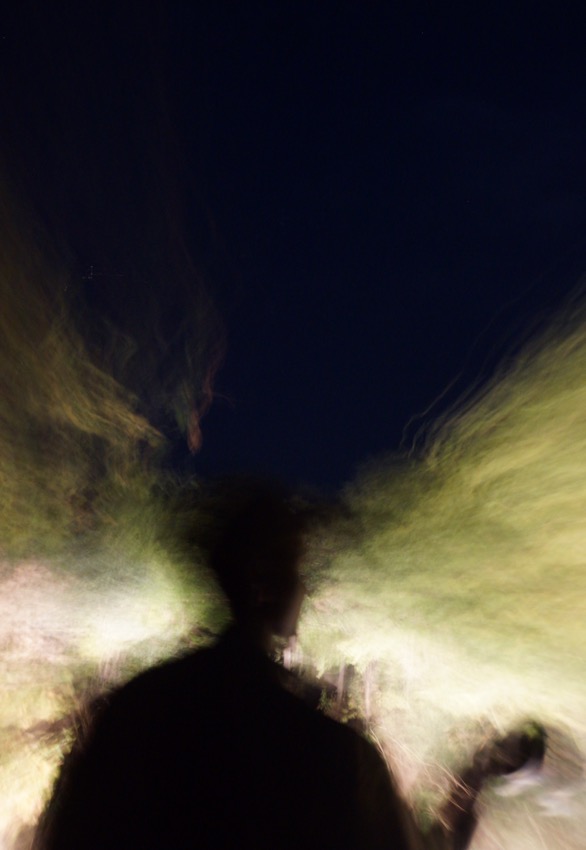 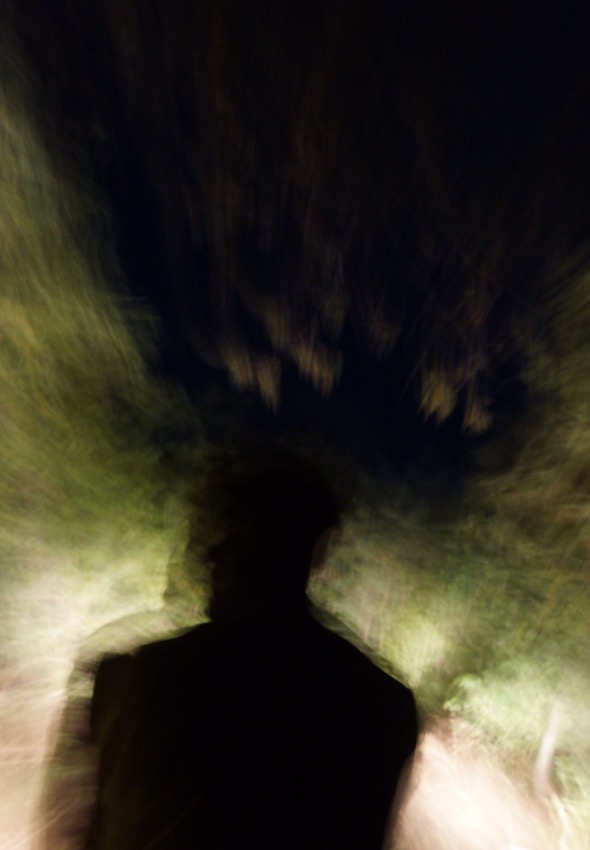
 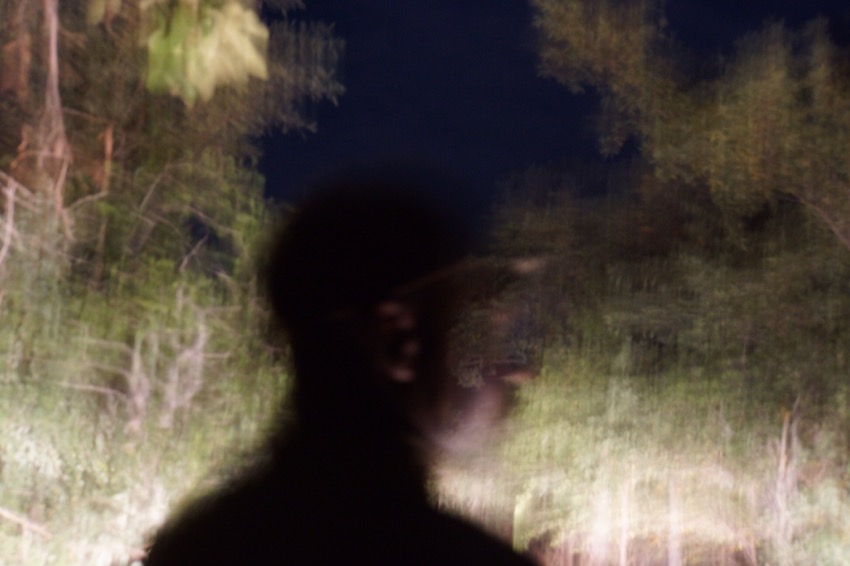
Back at the lodge we have dinner by the pool under the stars with the manager, Charl. We hear about the Anglo-Zulu war of 1879, which Charl used to lecture on, and about his family’s history in Namibia (his grandfather sold supplies to gold miners) and in Stellenbosch, South Africa, where his family had a wine farm. Back to our chalet to pack for an early start tomorrow
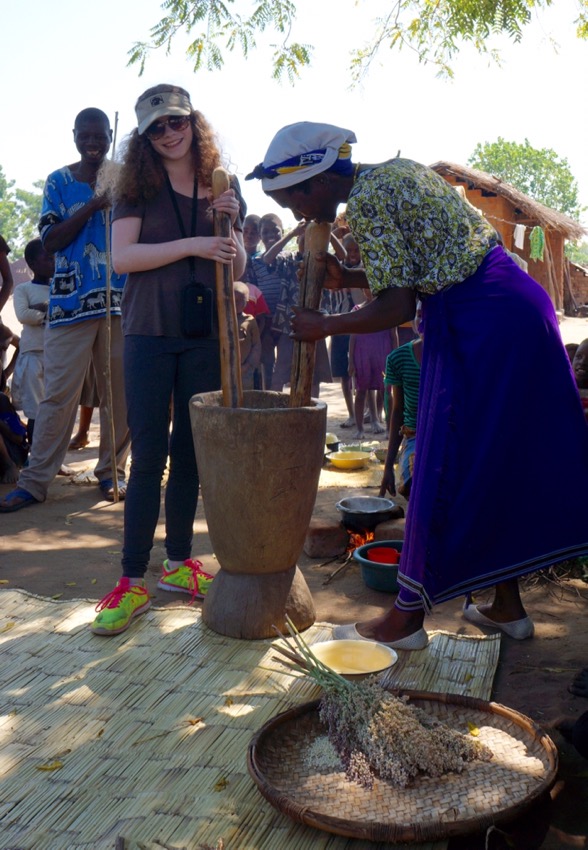
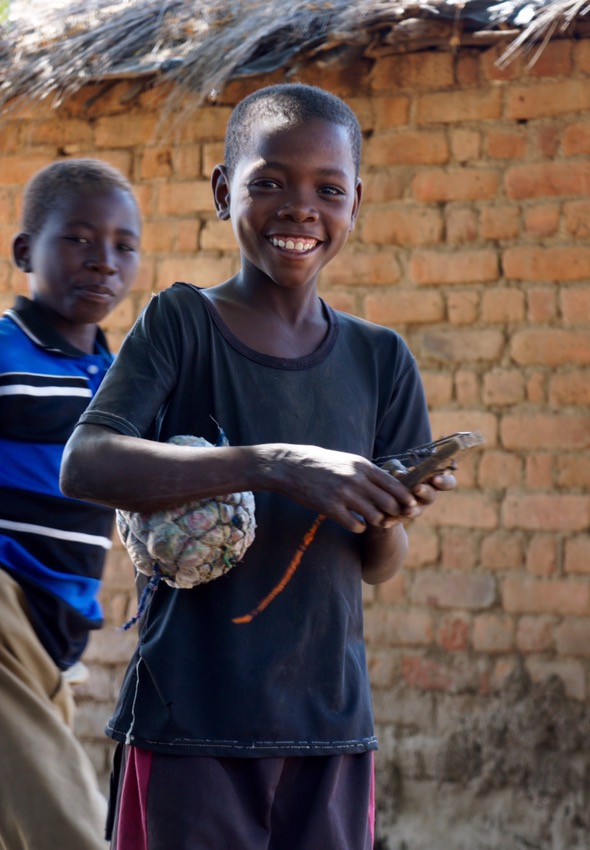
May 15
The two pictures above belong in the village discussion below, but I’ve already wasted WAY more time than it’s worth trying to move them, so they’re staying here.
Zoe’s thirteenth birthday! What a treat to be able to spend it alone with her in Africa.
Zoe is still pill-challenged, so that Carol is in charge of cutting it into four pieces and hiding it in yogurt to help with the process (note Carol’s hand with the spoon), over breakfast each morning.
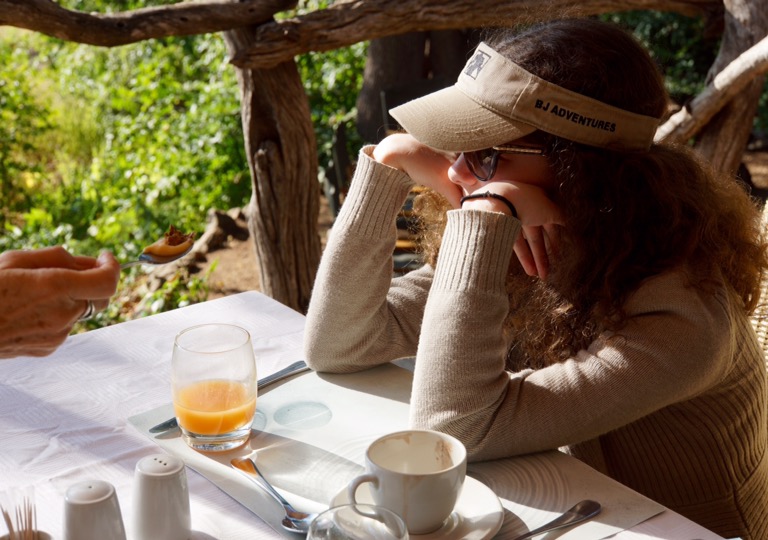 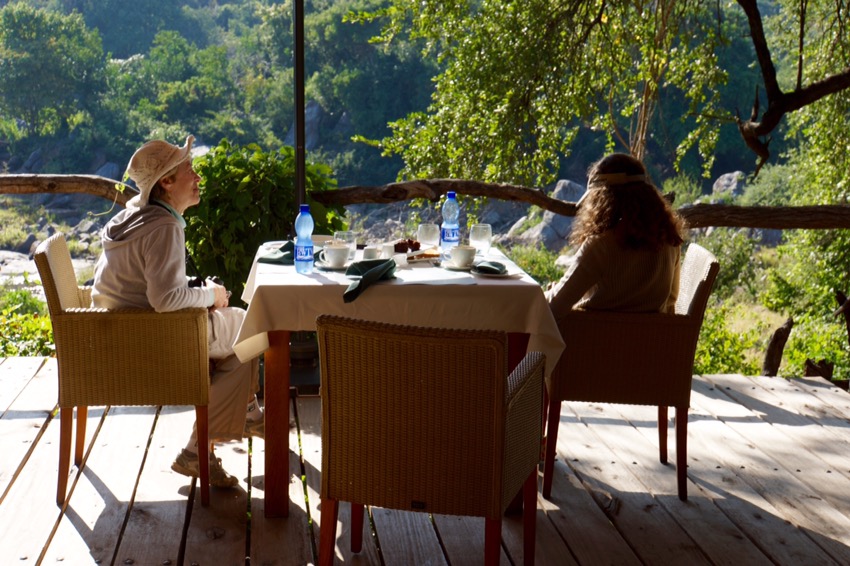 
Carol and I were quite skeptical about today’s morning activity, which was described in the itinerary as, “This morning you will drive 20 minutes from the Majete Wildlife Reserve to Sekera Village near Chikhwawa Boma. learn more about the people, culture and daily living of Malawian villagers on your Majete Community Visit. Experience the traditional lifestyles of Malawi and witness the age old customs of a Lower Shire village. Learn about the staple food in the area, view traditional arts and crafts including mat and basket making, walk through the village to see the type of houses built by the community, learn about community income generating projects, and experience the local masked “Gule Wamkulu” dance.” Well, guess what, we did all of these things and, while clearly they were planned with us in mind, it did not feel at all hokey or artificial. There was no attempt to sell us anything, nor were we asked for a donation (we’d paid a fee of just over $100, for the three of us to do the tour).
This was a village much like what Carol and I have experienced many times in Ghana, except that the swarm of kids here was far better behaved than the enthusiastic little kids we saw in Ghana villages. As we walked along with them from place to place, the kids were guided occasionally by men with sticks, much the way goats might be. This sounds terrible, but in fact it was done very gently and subtlety. We were very glad that Zoe was exposed to the village. At the dance ceremony we saw, we convinced Zoe (under some duress) to sing a song for the assembled throng, which was warmly received. We explained to Zoe that this type of sharing is a way of showing respect and building relationships and that it’s worth doing, even when it takes you a bit outside your comfort zone. She understood. As part of the dance performances, the villagers sang happy birthday to Zoe.
 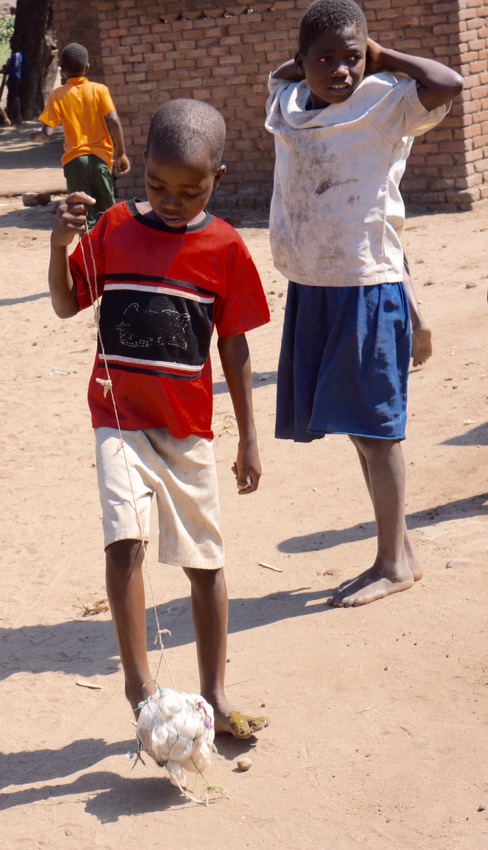 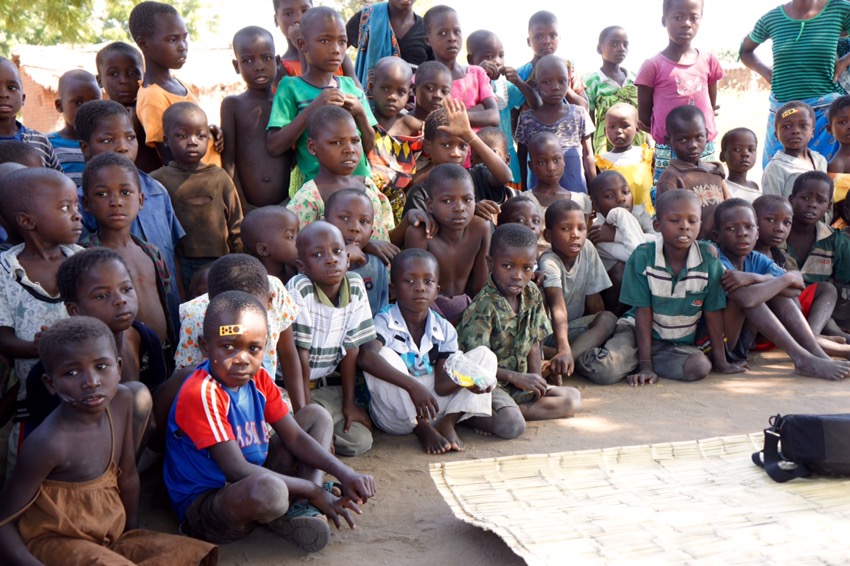
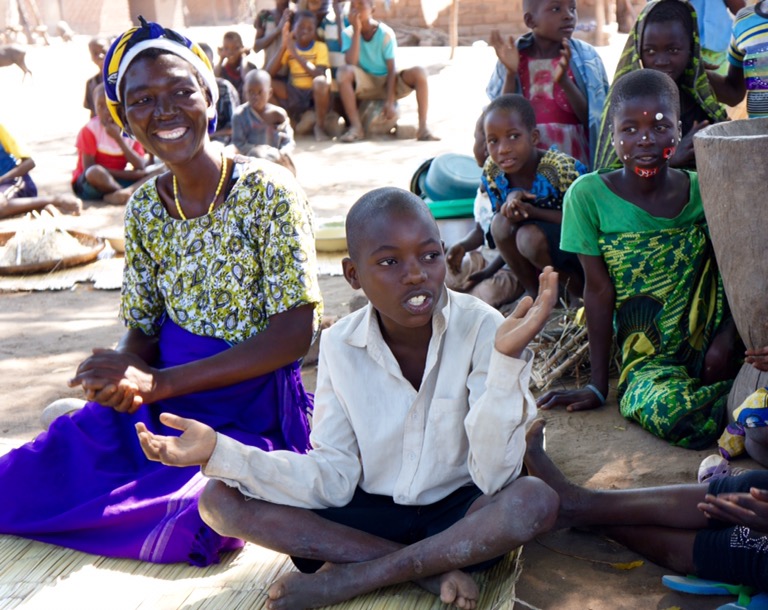 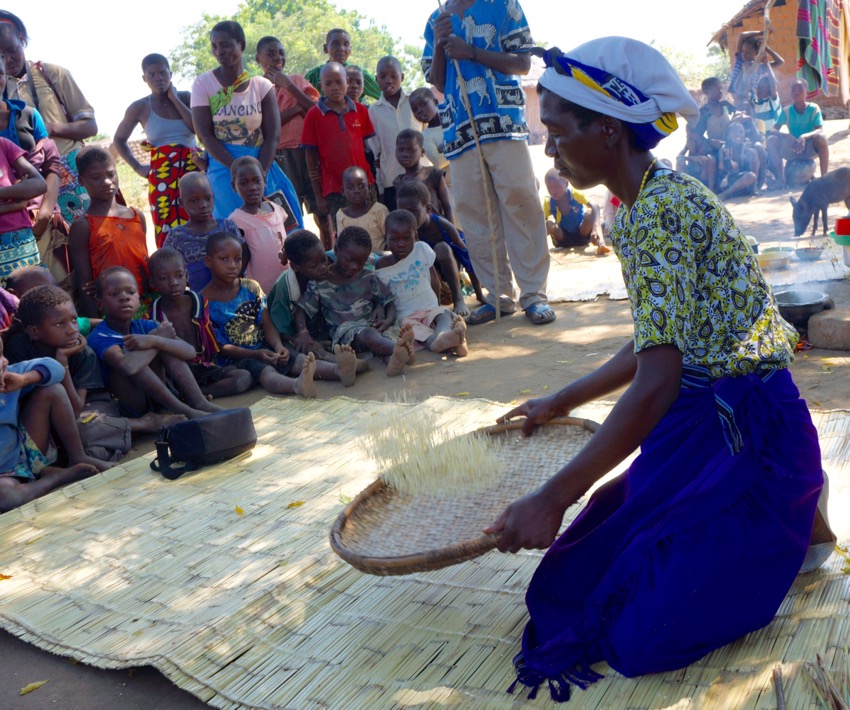

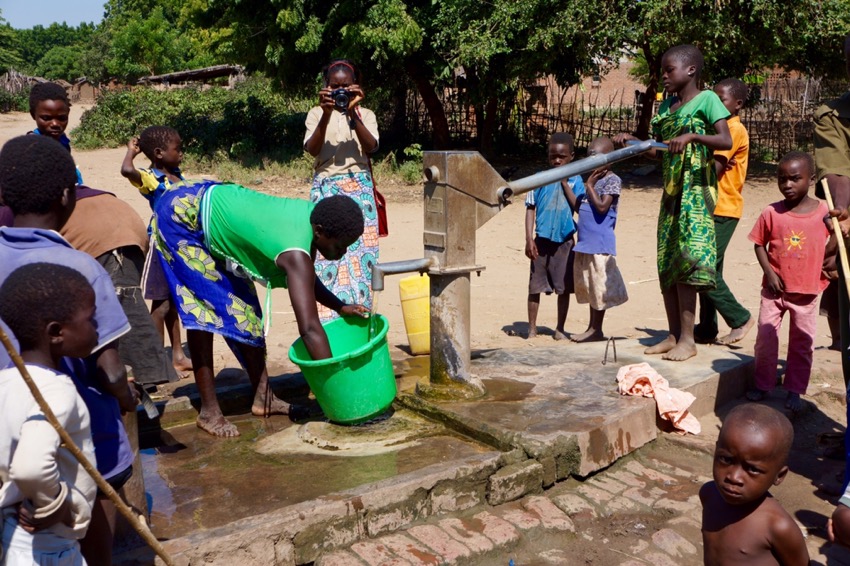
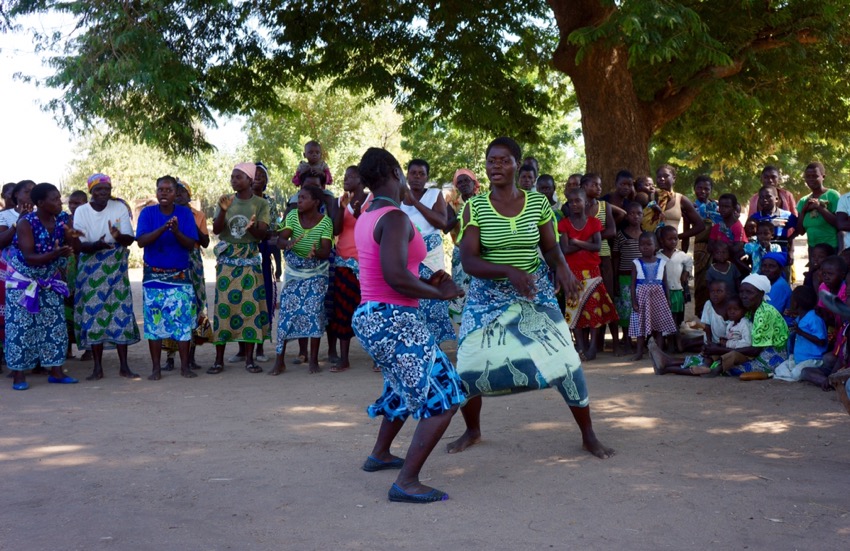 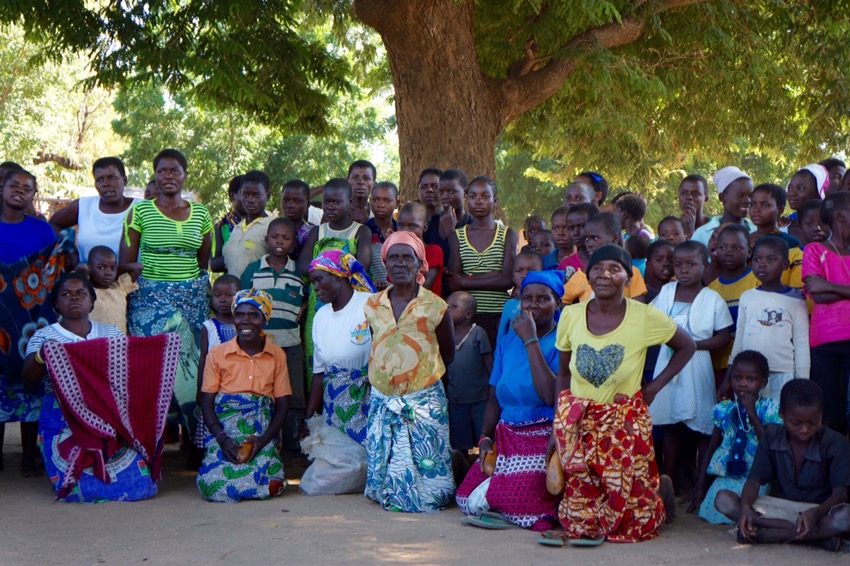
 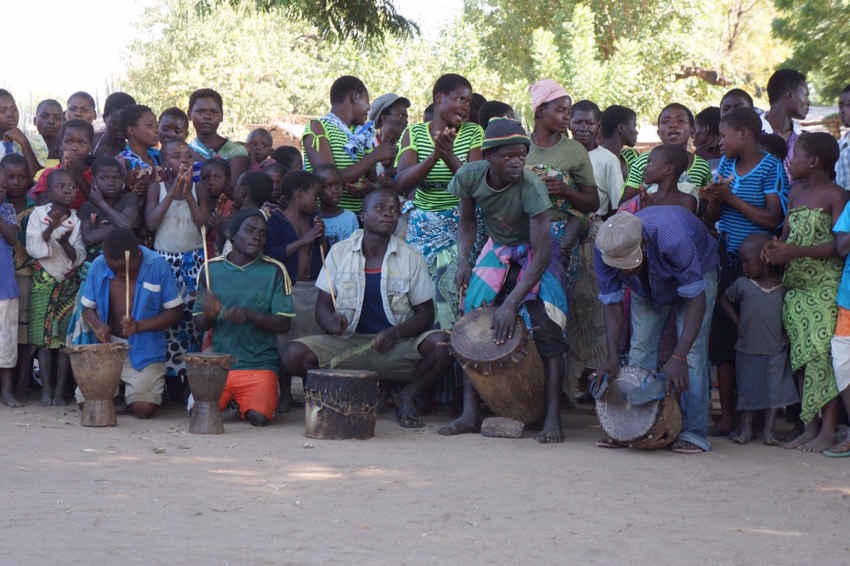
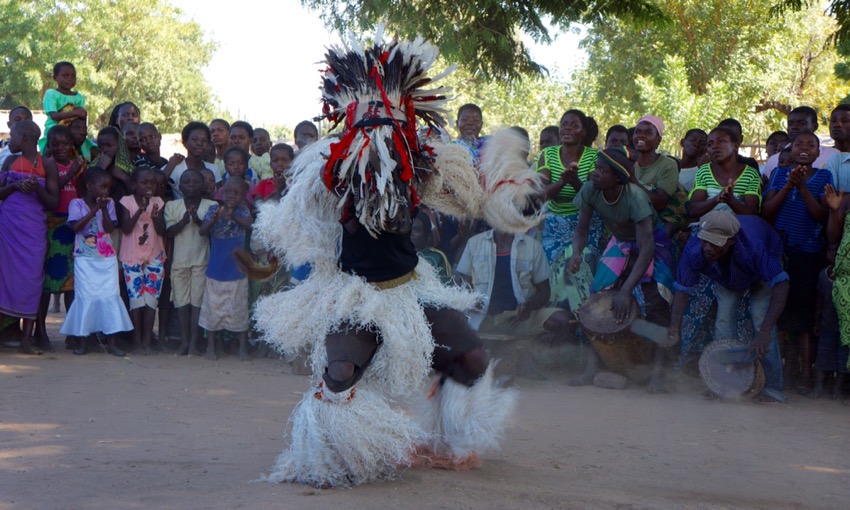 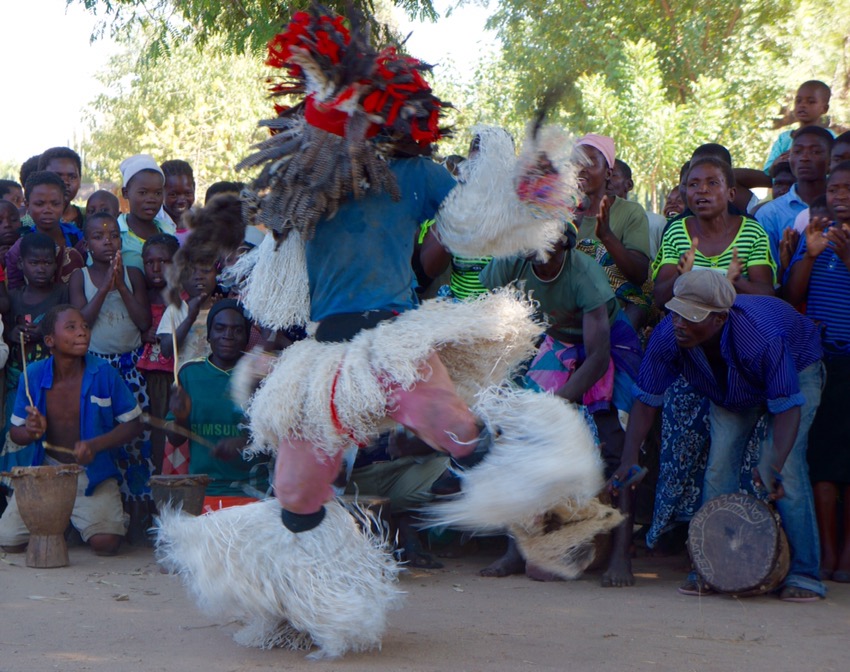 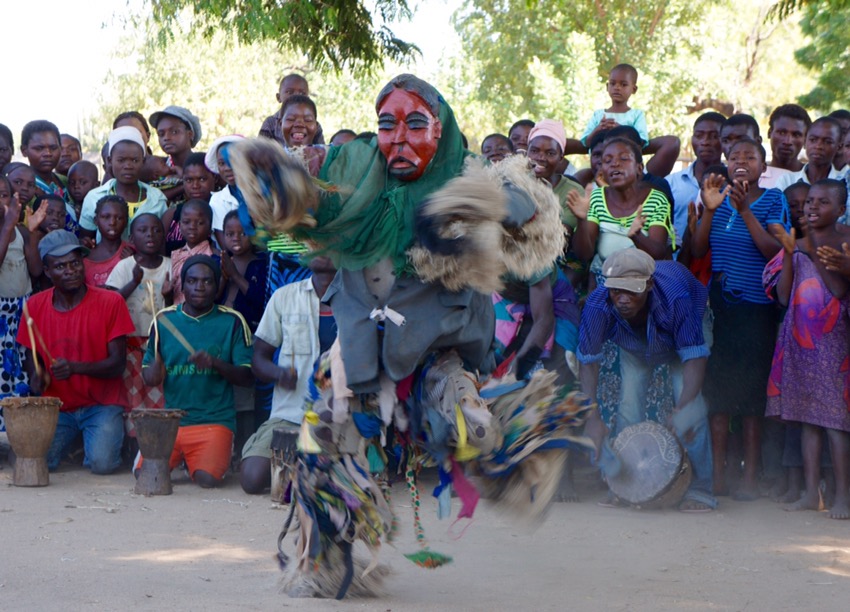
On the way back to the lodge, we stopped for a drink, and Zoe was able to talk to her family, which made her (and, I’m sure, them) very happy. I was able to post that I wasn’t blogging because of lack of internet at the lodge. More importantly, I was able to check and find that the Cubs had beaten the Pirates twice while I was offline. Life is good.
We drove back to the lodge, spotting more game en route. Rather light lunch, then we decided on a late drive this evening, so Zoe and Carol are up at the pool and I’m blogging on our private deck overlooking the river.
So, for those of you who have not been on safari, this afternoon/evening’s drive provides a good example of the experience.
Showering before the afternoon drive was an excellent idea, as even though it’s supposedly winter here, it was sunny and in the 80s at the village, so removing the grunginess felt great. To begin (and end) the drive, we need to walk across the river on the suspension bridge that is about 100 yards long. So imagine yourself walking the length of a football field across a swift river, bouncing on narrow boards with hungry crocodiles waiting below. I lied about the crocs and there are wires that one can hold onto as you cross, but it’s still a bit of a thrill, swaying high over the river.
Starting off late in the afternoon, the air is cool, the wind in your face, and you are filled with anticipation for what you may find. You remain alert, keep your eyes peeled, even though more than 90% of what’s seen is found by the guide or spotter. When occasionally you spot something the guide has not seen, he tells you, “well spotted” and you are filled with pride and think yourself ready to become a full time safari guide.
The road is jarringly bumpy. The sky grows darker, as the sun begins to set, and you can see mountains in the distance against the colorful sky. We spot a few things, most notably, a beautiful antelope called the sable, but nothing particularly exciting. After about an hour, you begin feeling philosophical, telling yourself that sometimes you just don’t see interesting stuff and it’s all about the search, anyway. I’m not a fisherman, but I imagine the feeling is akin to what a fisherman feels, enjoying being out in the boat, even if the fish aren’t biting.
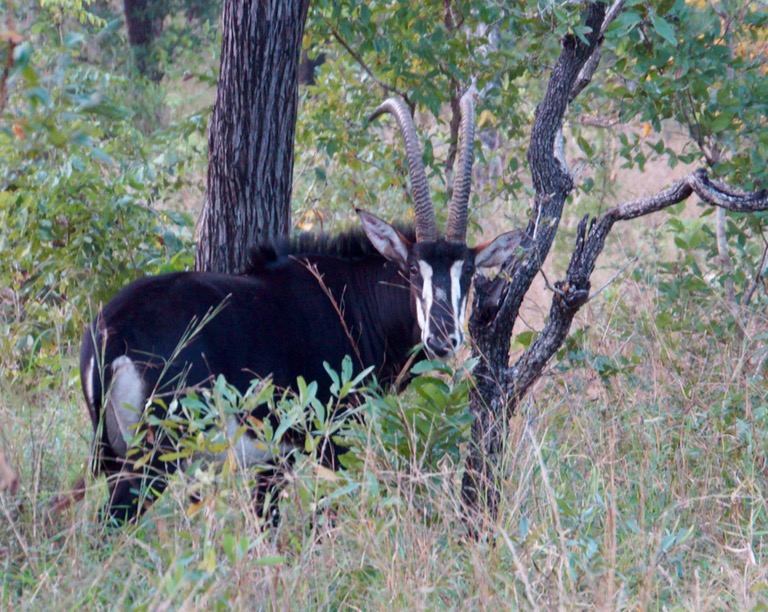 It’s dark now, and the spotlight is being shone back and forth across the road by the spotter. Then, suddenly, lions, a male and female, appear, together with the evidence that their relationship was non-Platonic–two cubs. You watch the lions for about half an hour; the drive clearly is a success. It’s dark now, and the spotlight is being shone back and forth across the road by the spotter. Then, suddenly, lions, a male and female, appear, together with the evidence that their relationship was non-Platonic–two cubs. You watch the lions for about half an hour; the drive clearly is a success.
 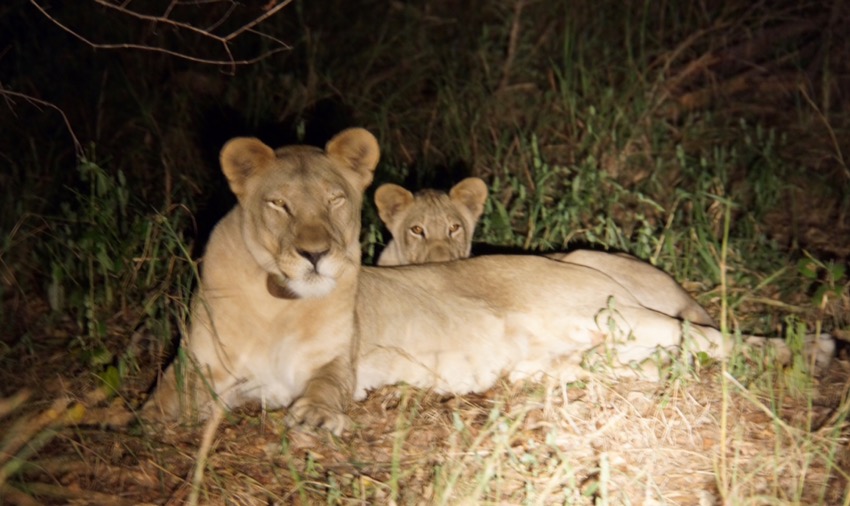 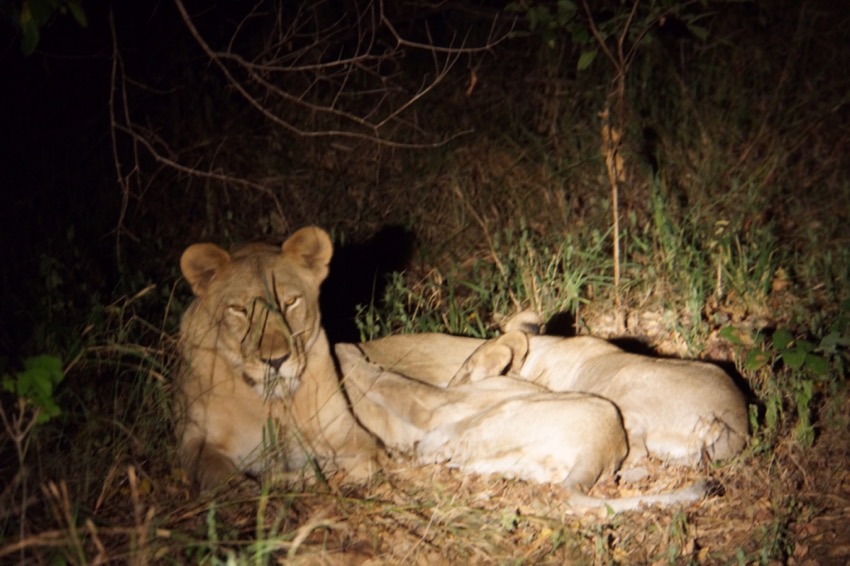 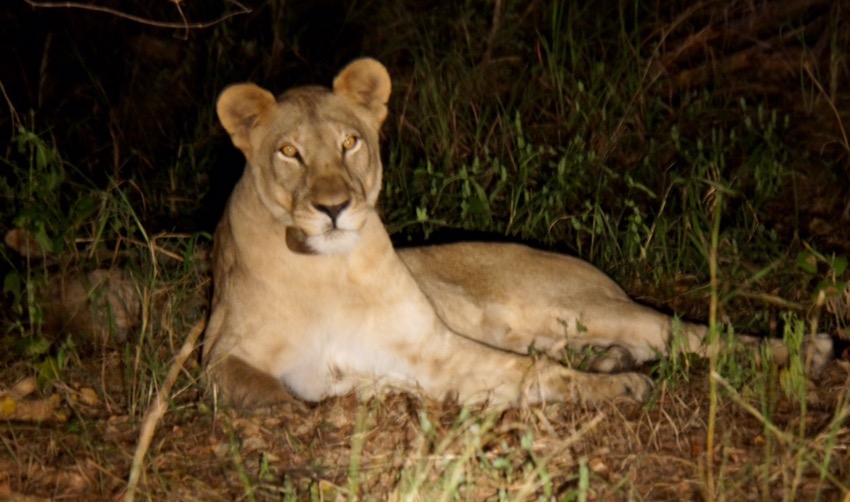
As we head back to the lodge, we hear a hissing sound, as one of our tires goes flat. Another adventure. Our guide and spotter change the tire, with us remaining in the jeep. A second flat tire would present a real problem, though the guide has a radio and could call for help.
Tire fixed, we head back to the lodge, and are joined at dinner by the Swedish guy, Mike. At the close of dinner, the entire staff marches out with a cake, singing happy birthday to Zoe.
I’m guessing that her thirteenth birthday is one Zoe will not soon forget.
May 14
We arise at the ungodly hour of 4AM for our transfer to the Cape Town airport and our 2-hour flight to Joburg. Zoe is not exactly what one would call a morning person, so she is bleary-eyed. The hotel has packed us box breakfasts, which we eat on the flight. Freedom meets us at the Joburg airport and assists in pointing us towards our approximately 2-hour flight to Malawi, where we will be met and driven on a two and a half-hour scenic trip to the Majete Wildlife Reserve.
The drive is indeed scenic, but it also passes through wonderful African roadside stores and markets, not all that different from what we’ve seen on our many trips to Ghana. As a photographer, I find it very frustrating not to be able to stop, walk around and photograph these scenes. Because of time constraints, I’m left to shoot from the car, often while we are in motion. Here’s some of the rather mediocre results, including a bunch of charcoal, made from trees chopped down illegally by natives–a big conservation problem.
 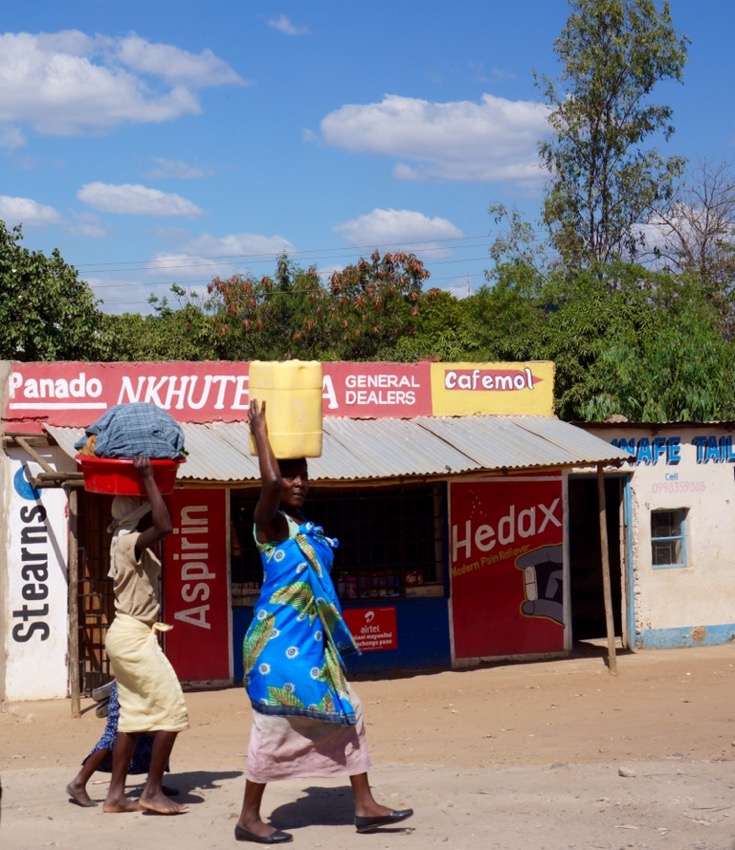 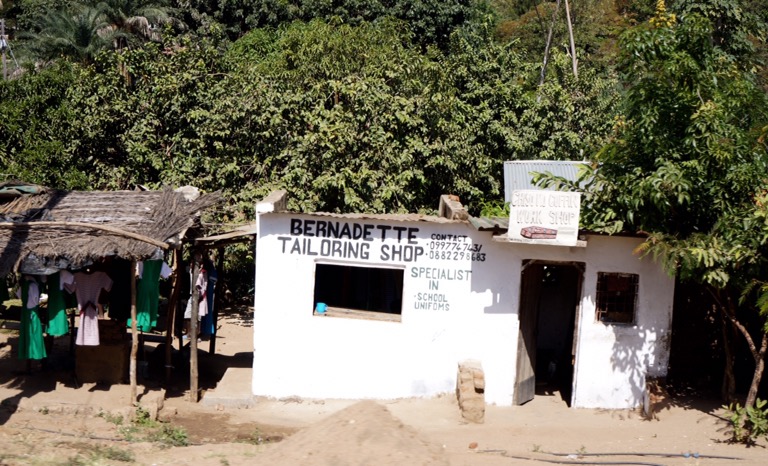  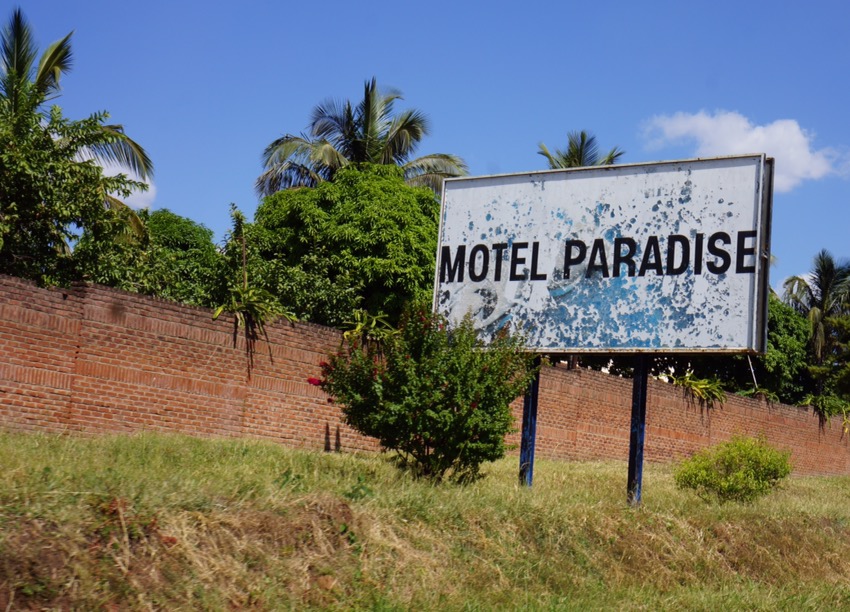 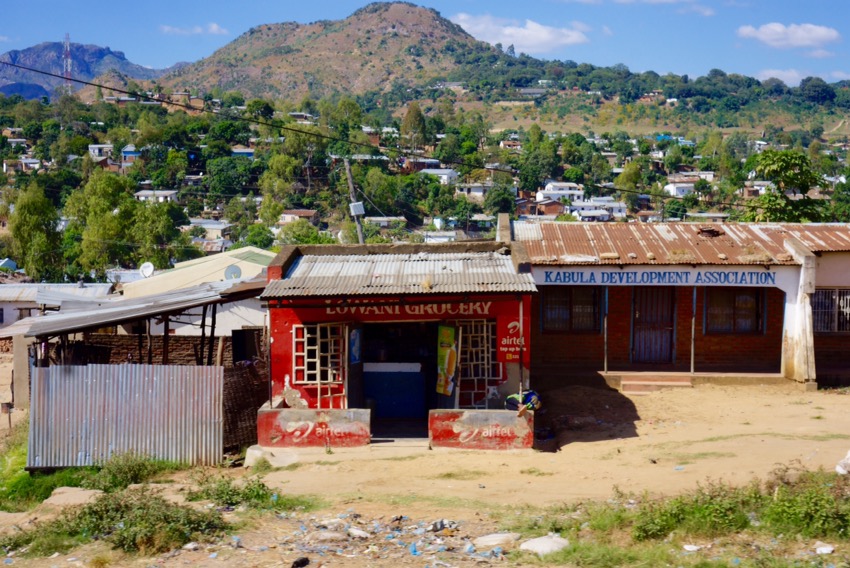 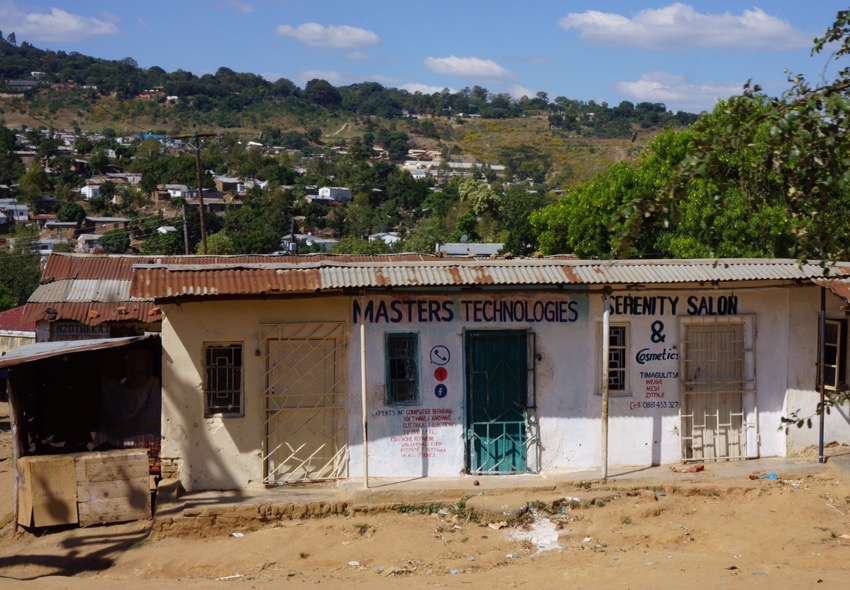  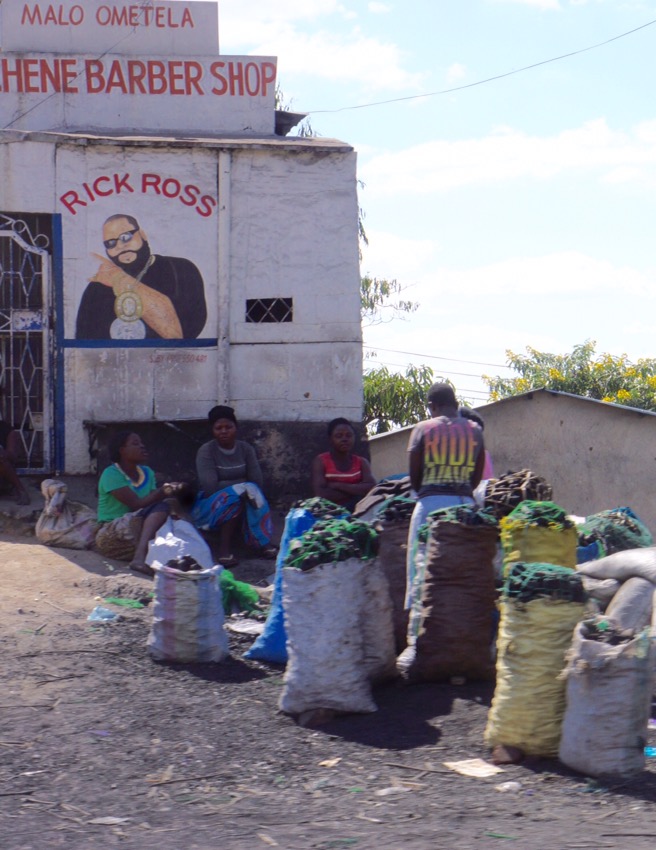  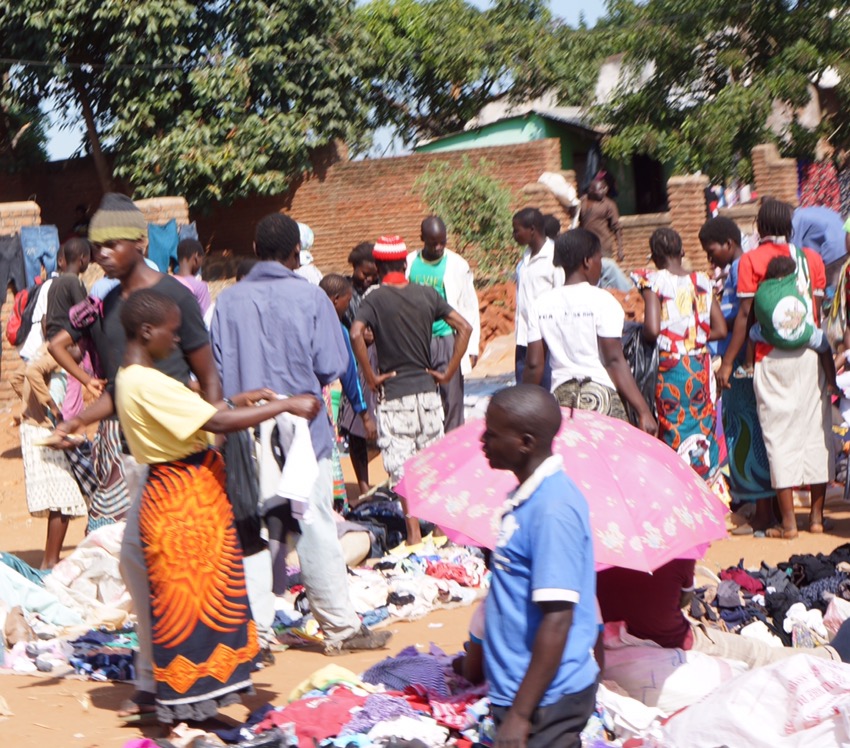 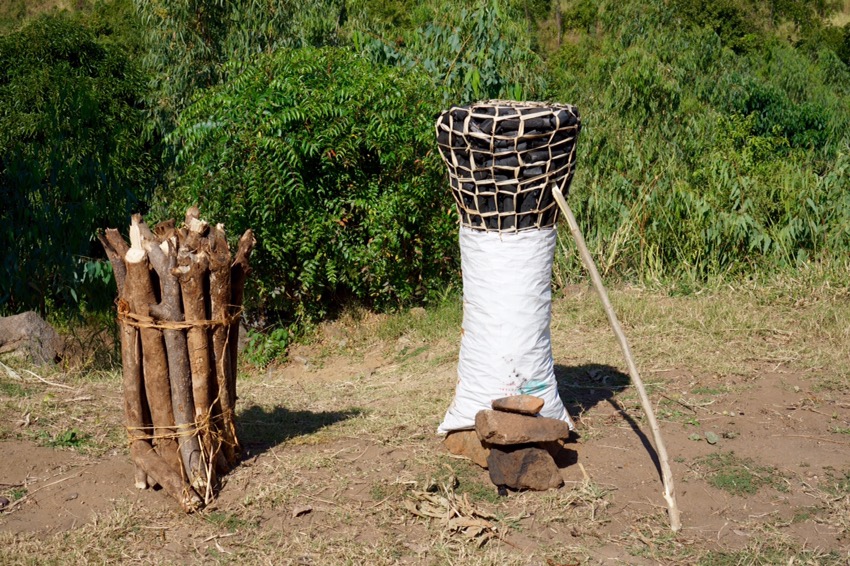 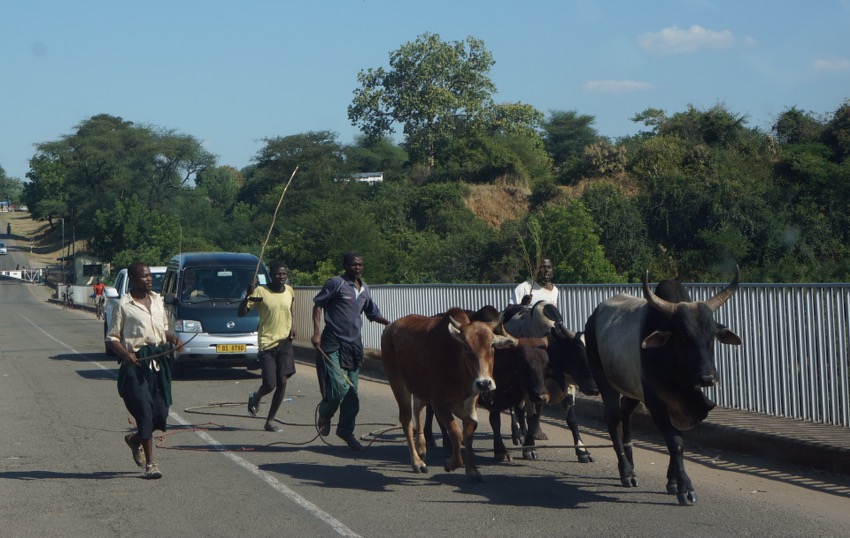
Located in the south of Malawi close to the city of Blantyre, Majete is an area of 70,000 hectares, part of Africa’s Great Rift Valley. The reserve is made up of mature miombo woodlands and granite topped hills that contrast with picturesque river valleys and lush forest. It is one of the big success stories in African conservation, as after decades of poaching, hard work has turned the reserve back into a sustainable development as well as the only official Big 5 Game Park in Malawi. Previously-endangered species now live and breed there.
We will be staying for three nights at Mkulumadzi, an idyllic location at the confluence of two rivers shaded by giant leadwood trees. It is combines isolation with first-class facilities. And, if you are going to be isolated, I have always favored first-class isolation. Indeed, first-class understates this place.
As we walk haltingly across the rickety suspension bridge to the lodge, Zoe tells Carol that she’d really like to live to become thirteen (tomorrow). Mkulumadzi has eight chalets, spacious living quarters and a private viewing deck. The lodge offers a pool, dining under the stars, river cruises, game drives, and walking safaris. Our chalet is spectacularly lovely. And Zoe loves having a private room with deck, and her own bathroom. Tough, I know, but, hey, somebody’s gotta do it. The one thing this place does lack, though is wifi, so it’s going to screw up my ability to post daily.
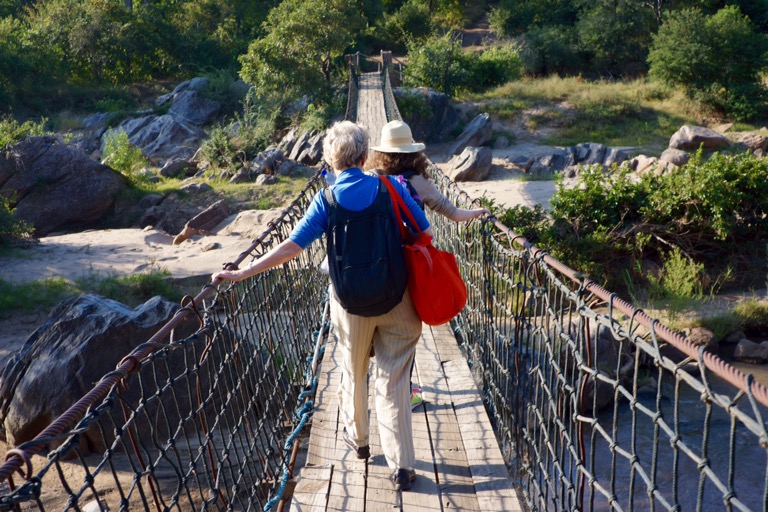 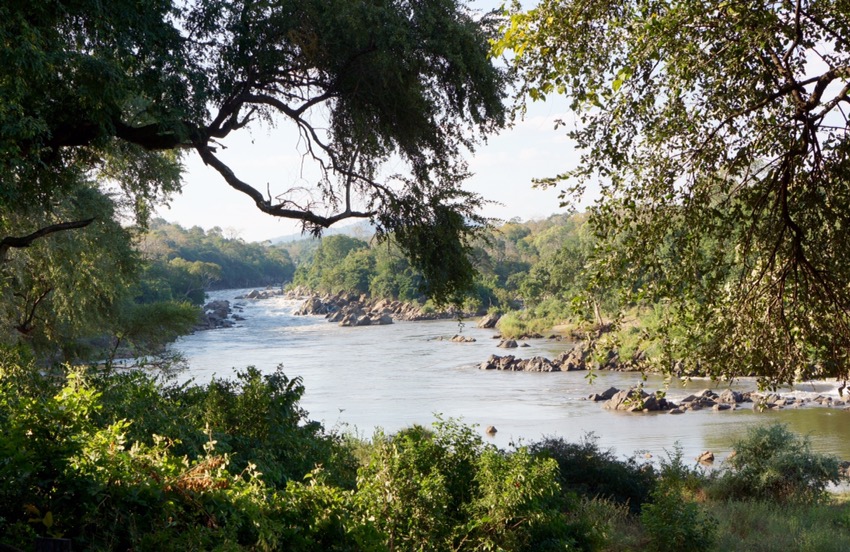 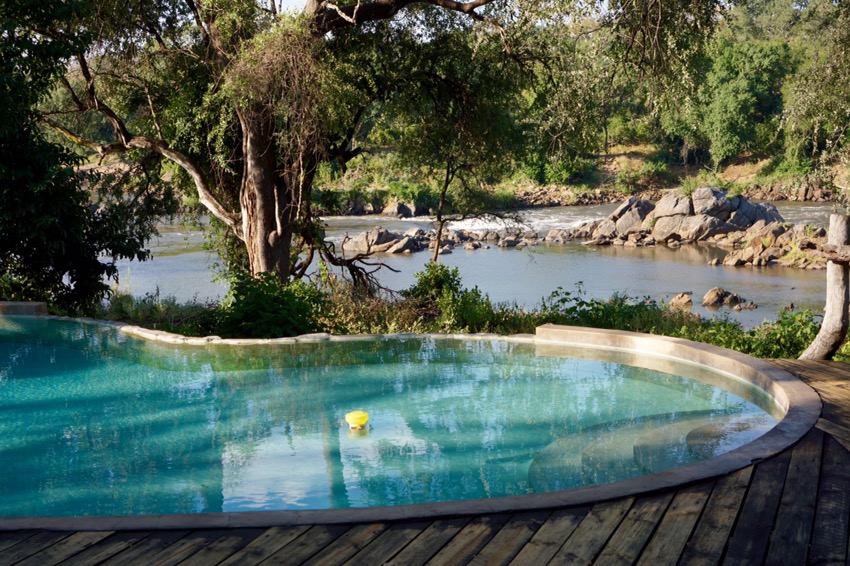
As Majete is virtually undiscovered by tourists, our itinerary boasts that “Majete is a true wilderness where every trip into the bush with experienced guides will feel like an adventure.” Based on our afternoon/evening drive, that’s a bit of hyperbole. We did not have great luck in finding unusual sights, but that happens, the gin and tonic sundowner and macadamia nuts were good and we’ll probably fare better in the game viewing tomorrow.
We have a barbeque dinner outside under the stars, together with the one other guest in the lodge, Michael from Sweden, who is here to monitor the progress of some water projects done by the not for profit group that he works for. We’re able to compare our Ghana water experience with Michael and talk with him about the problems in this extremely poor country. I think it’s good that Zoe is being exposed to these kinds of issues and discussions.
We’re exhausted from our 4AM start and so retire early. But you may not be as tired, so here’s a bit about Malawi. We’ll be giving a quiz when we return.
The Republic of Malawi may be one of Africa’s smallest countries but when it comes to exploration and adventure, it has tremendous amounts to offer; from grasslands and forests, mountaintops, unspoilt wildlife parks to Africa’s third largest and most beautiful lake.
Malawi, a landlocked country in southeast Africa, was formerly known as Nyasaland. It is bordered by Zambia to the northwest, Tanzania to the northeast, and Mozambique on the east, south and west. The country is separated from Tanzania and Mozambique by Lake Malawi. Malawi is over 118,000 km2 (45,560 sq mi) with an estimated population of 16,777,547 (July 2013). Its capital is Lilongwe, which is also Malawi’s largest city; the second largest is Blantyre and the third is Mzuzu. Malawi is among the smallest countries in Africa. The name Malawi comes from the Maravi, an old name of the Nyanja people that inhabit the area. The country is also nicknamed “The Warm Heart of Africa”.
Situated on the Great Rift Valley, Malawi is dominated by Lake Malawi, a magnificent body of water, 365 miles long and 52 miles wide (hence sometimes referred to as the calendar lake), it occupies about a third of Malawi’s area. It’s teaming with life including over 400 species of cichlid fish, a lot of which are endemic to it. Most of Lake Malawi’s astounding underwater diversity is protected within the Lake Malawi National Park which is a World Heritage site and also one of the first in the world set aside for the protection of freshwater fish.
The area now known as Malawi was settled by migrating Bantu groups around the 10th century. Centuries later in 1891 the area was colonized by the British. In 1953 Malawi, then known as Nyasaland, a protectorate of the United Kingdom, became a protectorate within the semi-independent Federation of Rhodesia and Nyasaland. The Federation was dissolved in 1963. In 1964 the protectorate over Nyasaland was ended and Nyasaland became an independent country under Queen Elizabeth II with the new name Malawi. Two years later it became a republic. Upon gaining independence it became a one-party state under the presidency of Hastings Banda, who remained president until 1994, when he lost an election. Peter Mutharika is the current president.
Malawi has a democratic, multi-party government, and a small military force that includes an army, a navy and an air wing. Malawi’s foreign policy is pro-Western and includes positive diplomatic relations with most countries and participation in several international organizations, including the United Nations, the Commonwealth of Nations and the Southern African Development Community.
Malawi is among the world’s least-developed countries. The economy is heavily based in agriculture, with a largely rural population. The Malawian government depends heavily on outside aid to meet development needs, although this need (and the aid offered) has decreased since 2000. The Malawian government faces challenges in building and expanding the economy, improving education, health care, environmental protection, and becoming financially independent. Since 2005, Malawi has developed several programs that focus on these issues, and the country’s outlook appears to be improving, with a rise in the economy, education and healthcare seen in 2007 and 2008.
Malawi has a low life expectancy and high infant mortality. There is a high prevalence of HIV/AIDS, which is a drain on the labor force and government expenditures. There is a diverse population of native peoples, Asians and Europeans, with several languages spoken and an array of religious beliefs. Although there was periodic regional conflict fueled in part by ethnic divisions in the past, by 2008 it had diminished considerably and the concept of a Malawian nationality had re-emerged.
May 13
Today we are picked up at 8:15 a.m. by Godfrey, for our 9 AM tour at Robben Island, a half hour boat ride from Capetown. From the 17th to the 20th Centuries, Robben Island, where Nelson Mandela was imprisoned, served as a place of banishment, isolation and imprisonment. Today it is a World Heritage Site and museum, a poignant reminder to the newly democratic South Africa of the price paid for freedom.
We are shown around the prison by a former political prisoner who speaks first-hand of the conditions, treatment and torture he endured. What allowed him to survive it and to come to peace with the experience was his ability not to take his suffering as a personal matter, but as part of a movement that was much larger in scope. It’s a sobering, chilling experience of man’s inhumanity to man and an amazing glimpse into what preceded freedom. A pile of stones in the courtyard was created spontaneously by the former political prisoners at a reunion in 1995. For Zoe, the visit to Robben Island is especially meaningful, as she can experience what she read about in Nelson Mandela’s autobiography, LONG WALK TO FREEDOM. The tour is 3-1/2 hours long including the two half-hour boat rides to get there, and our safari friends, Jill and Bob, join us. 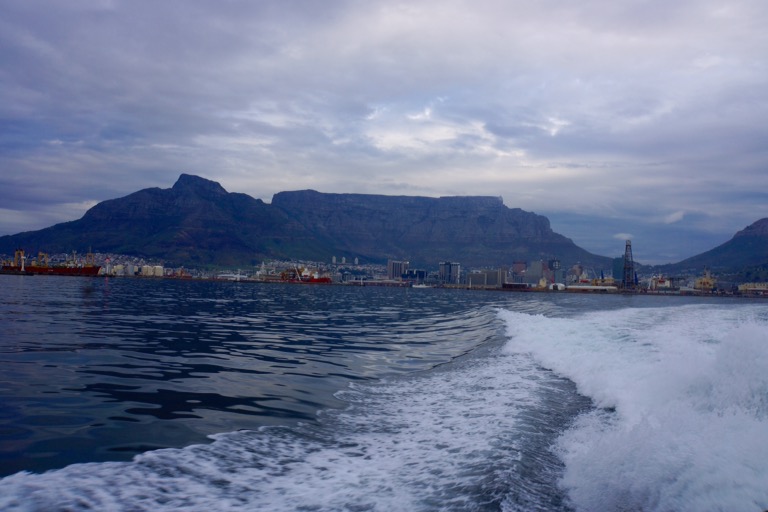
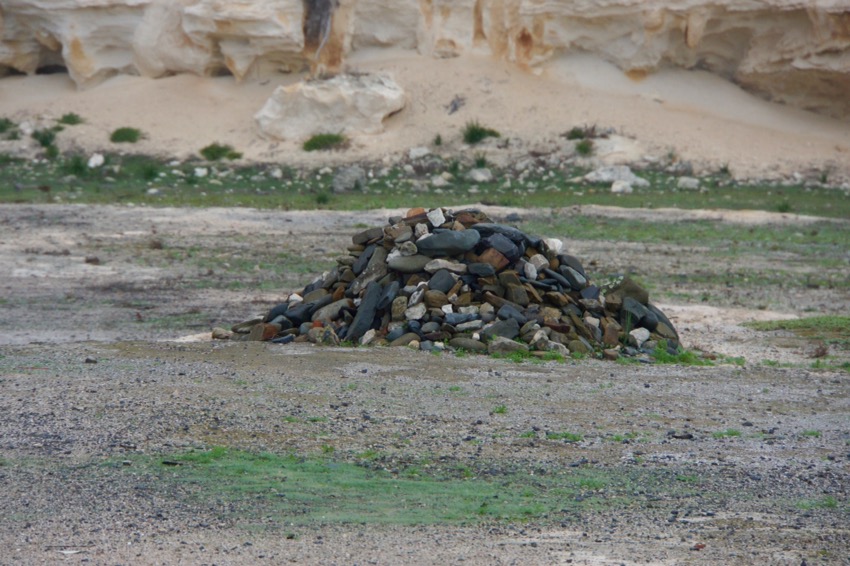 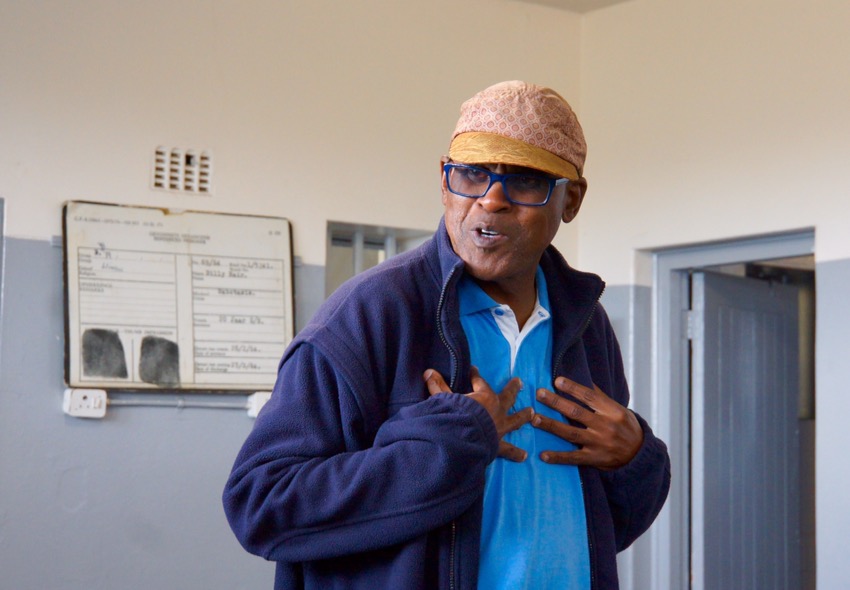 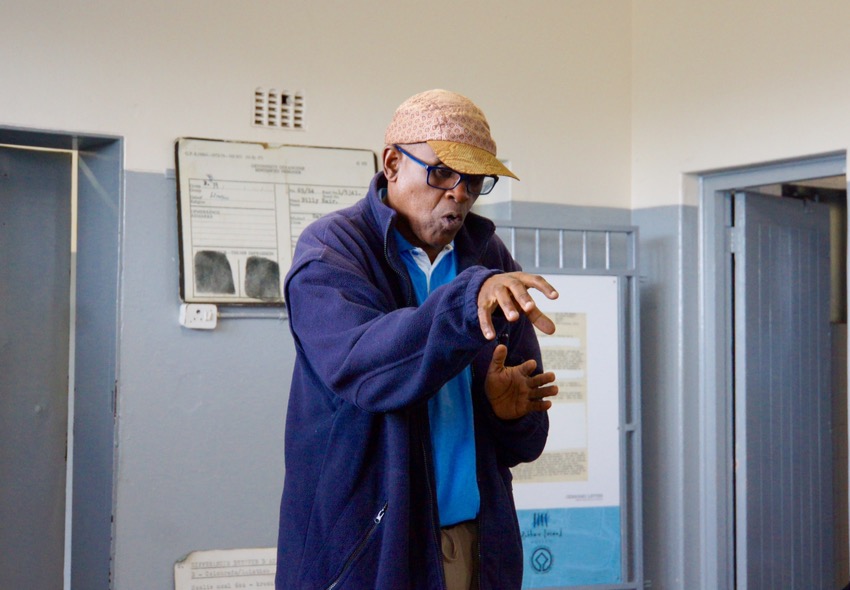 
After the tour, we have lunch with Jill and Bob, then Carol, Zoe and I go on to the South African Art Museum, which is worth a visit. We then head back to the hotel to pack, blog and nap a bit.
This evening, we sample African cuisine at the “shabby chic” and “funky-authentic” Cape Town institution, Mama Africa, while seeing the performance of African Jazz band Abavuki, who are a powerful African Jazz outfit from Langa (where we visited yesterday) and have been playing their exciting, infectious afro-beat marimba grooves since 2001. The eight members in the group, all multi-instrumentalists, are influenced by kwaito, samba, jazz and traditional rhythms, which they translate within a modern format, using marimbas, percussion and brass instruments. The Xhosa name “abavuki” means “Wake up, early birds!” and this attitude is palpable in Abavuki’s high-energy, uplifting music that not only reflects their youth, but their optimistic outlook on life and their approach to music-making. It is a testimony to the resilience of South Africans and the redemption the country has found in music in its path to reconciliation. We’re joined by Jill and Bob again. Surprisingly, even the food is excellent. Zoe enjoyed the music and is into photographing everything for her blog. Great fun.
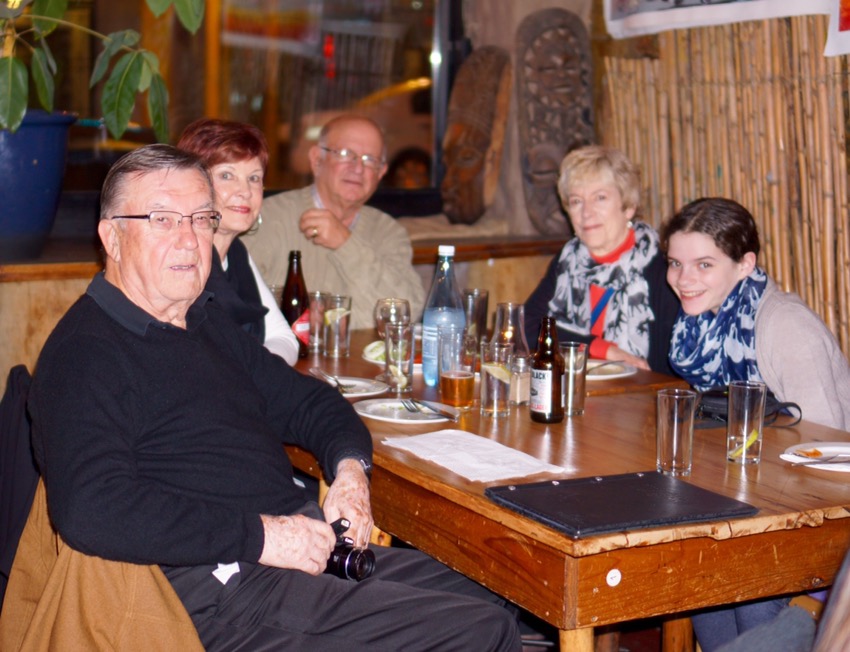 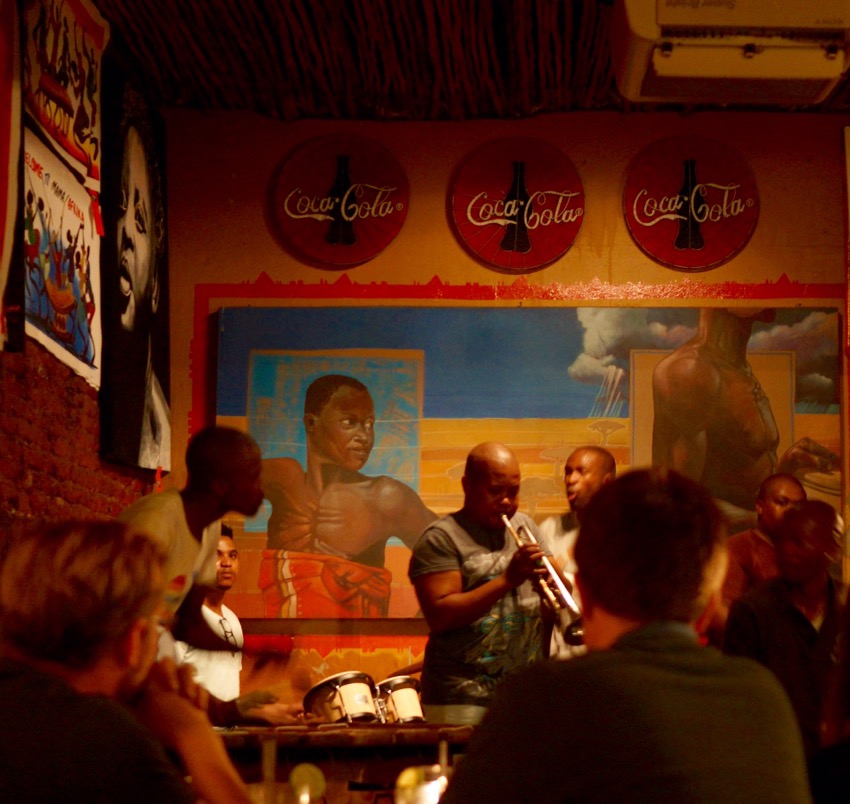 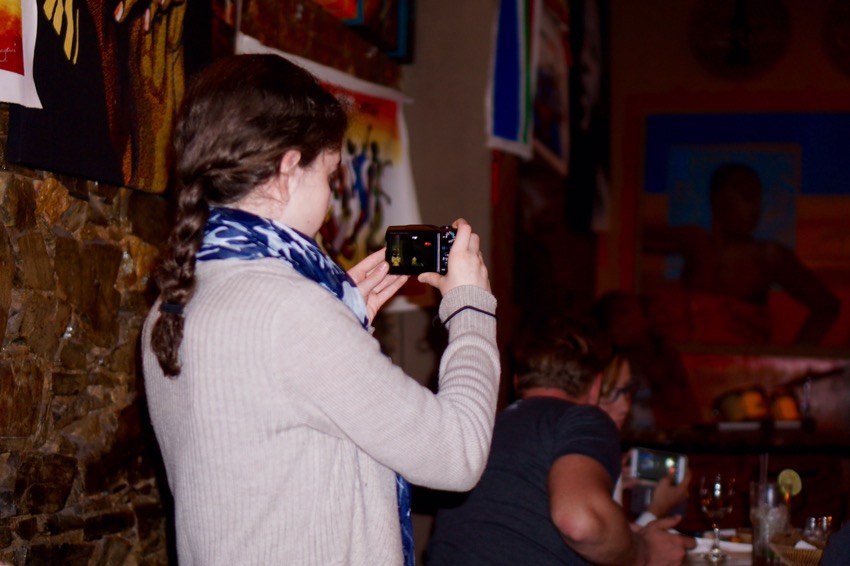  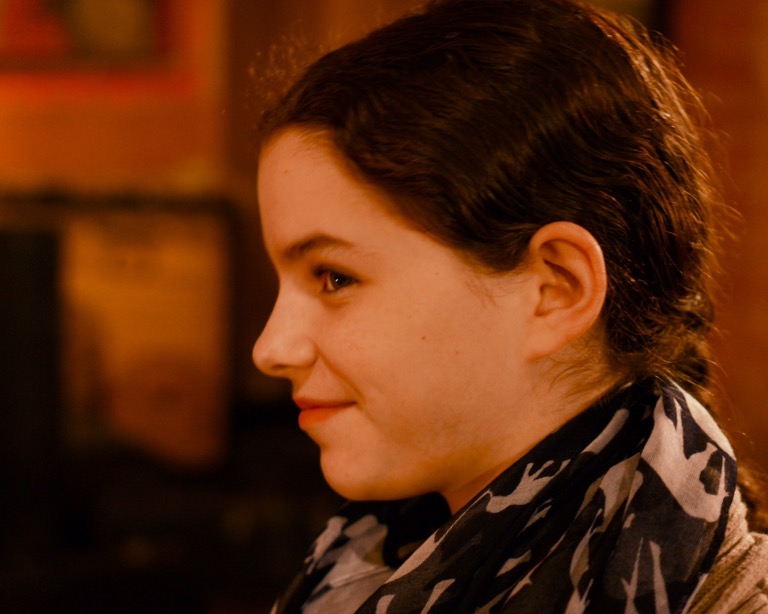
We’re in Malawi without wifi, but otherwise everything is great. Will post again, one day at a time, when I can. Not sure whether I’ll be able to do that before we return home.
|
|



 River safari doesn’t happen because of boat problem.So, instead we do another land safari, ending in a great sundowner sunset.
River safari doesn’t happen because of boat problem.So, instead we do another land safari, ending in a great sundowner sunset. 






































































